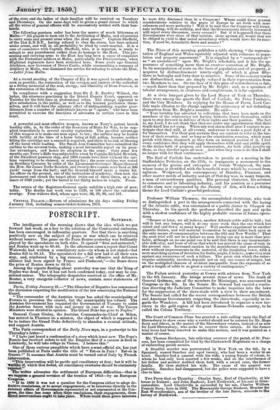The Times of this morning publishes a table showing "the
represen- tation of England and Wales equitably adjusted with reference to popu- lation and property assessment." It is supplied by a " correspondent " as "an amendment" upon Mr. Bright's schedules, and it has the ap- pearance of something more than an amateur correction of Mr. Bright. Inits manipulation of seats on the basis of population and of property, it acquires by disfranchisement ninety-eight, of which it gives fifty- three to boroughs and forty-four to counties. Some of the country towns are disfranchised, some are simply reduced in their representation from two Members to one. On the face of it this plan of redistribution is fair, —much fairer than that proposed by Mr. Bright ; and, as a specimen of tabular arrangement, in clearness and completeness, it is far superior.
At a civic banquet given by the Lord Mayor of York on Thursday, there were among the guests the Earl of Carlisle, Sir Peter Fairbaiiii, and the City Members. In replying for the House of Peers, Lord Car- lisle made allusion to the charge against the aristocracy of not defending themselves from Mr. Bright's assaults. He said-
" Your lordship has adverted to reflections that have been made on the members of the aristrocracy not having hitherto found themselves called upon to step forward in defence of their rights and their position. The fact is, my Lord I do not think that they are under any apprehension that their death-knell yet rung. When any real alarm shall arise I venture to an- ticipate that they will, at all events, endeavour to make a good fight of it for themselves. For their past services they are content to refer to the his- tory of their country, and as long as the constitution remains, which must perish with them, inasmuch as they form an integral portion of it, I feel every confidence that they will apply themselves with zeal and public spirit to the duties both of progress and conservation, for both alike devolve on them, as they devolve upon all men. And when they cease to do this I shall no longer wish for their continuance."
The Earl of Carlisle has undertaken to preside at a meeting in the Staffordshire Potteries, on the 27th, to inaugurate a monument to the memory Of the genius and enterprise of Josiah Wedgwood, the man whose name is identified with the household ware which he rescued from ugliness. Wedgwood, the contemporary of Brindley, Flaxinan, and other master minds of industry and art of that day was, in many respects, a man of extraordinary qualities. His personal character, his services to commerce and to labouring industry, and his position as a precurser of the class now represented by the Society of Arts, will form a fitting theme for Lord Carlisle's graceful prelection.






























 Previous page
Previous page